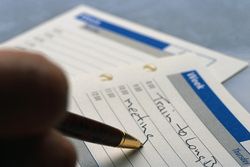 To use time effectively you need to be organised. This can be achieved with the introduction of a few simple techniques.
To use time effectively you need to be organised. This can be achieved with the introduction of a few simple techniques.
- Keep a diary – write down all the appointments and activities you need to remember
- Either in your diary or on a separate notepad write a ‘To Do’ list at the beginning of each day of all the things you aim to do that day. Against each time write ‘A’ or ‘B’. ‘A’ tasks are urgent and need dealing with first and ‘B’ tasks are not so urgent and can wait.
- Valuable time can be lost and frustration levels can rise looking for information. Therefore make a point of opening all mail on a daily basis, dispose of all non-essential items such as junk mail immediately and either file the rest or add as an action item to your ‘To Do’ list
Remember that you may perform better at certain times of the day and, wherever possible, you should save your most difficult tasks for when you feel your best. It can also be beneficial to build in ‘thinking time’ as a legitimate part of your daily schedule. Senior executives very often take time out of a busy schedule to reflect and think about what they are doing. Remember that unforeseen problems can occur so it is important to ensure a flexible approach to your daily routine to allow for these when they do happen.
It is important to a person’s psychological and physiological well-being to get adequate sleep. Sleep is essential for survival, health and fitness and research suggests that it is the quality of sleep which is most important. However, too little or too much may lead to poor performance. The amount of sleep required varies considerably from person to person. Most people sleep seven hours, some may need nine and others only five. Ironically it is often the worry about losing sleep which produces more negative symptoms than the loss of sleep itself. Many people underestimate the amount of sleep they actually get due to the amount of time they spend worrying about not sleeping when they are awake.
The kind of sleep which is most important is what is called REM or Rapid Eye Movement which is linked to dreaming. All people dream even if they wake without any memory of dreaming.
Stress is one of the main causes of sleep disturbance. Many people lay awake at night worrying about problems or thinking about the future in an anxious manner. Then having finally fallen asleep awake feeling tired as the original worries are still there.
For further reading: No More Stress!: Be Your Own Stress Management Coach
